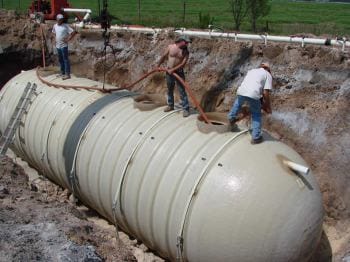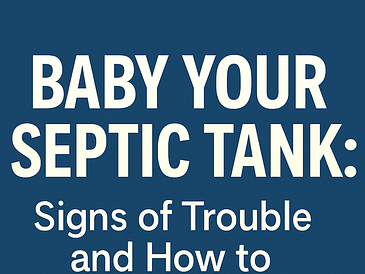RV parks depend on septic systems to handle their guests’ waste, which may cost as much as $40,000. Construction can vary based on size and specifications for each park.
Septic systems can be costly to operate and require regular sewage tank pump-outs; as a result, it’s crucial that you understand the costs associated with an RV park’s septic system.
Cost of the septic tank
Septic systems provide an effective means of disposing of black waste from RV toilets. Furthermore, it negates the need to dispose of it at public sites where health risks exist. However, it’s essential that RV park owners understand the cost associated with installing an onsite septic tank – this depends on which tank and installation option is chosen and whether they choose DIY or professional installation services.
An RV septic system typically consists of one large underground tank where wastewater flows. This tank’s capacity determines how many RV sites it can accommodate at one time.
Too much wastewater entering at once can present several problems to an RV septic system, including clogging up drain fields and leading to expensive sewage backups and repairs. Furthermore, improper waste treatment could pollute local water sources and lead to illness; to protect its system properly from these possible dangers it should be regularly inspected and emptied as required. To stay on top of it all an RV septic system should be regularly inspected and emptied as necessary.
RV owners often find that emptying their sewage tank at home rather than at a dump station can save both time and money, not to mention avoid potential sewage leaks. However, RV waste must always be dumped according to state-specific regulations – this may vary between states.
Connecting an RV to a septic system is an excellent way for campers to save both time and money on travel expenses, particularly long distance journeys. But installation must be performed correctly or else costly repairs and health risks could ensue for campers.
Cost of the drain field
RV parks require specific wastewater treatment systems because they serve many people at once, including advanced septic systems and leach fields to handle waste generated. A typical RV park septic system costs between $10,500 and $15,000 and typically comprises both a septic tank and leach field.
Cost of Septic System Installation? The total price for installing a septic system depends on several factors, including tank type and size as well as land clearing fees and percolation testing fees. Professional installation or DIY can incur different expenses; in either case the price range for tanks can range between $3,500 to $5,200 while additional expenses include excavation, laying pipes and creating drain fields.
Septic systems can last for over 40 years when properly maintained, but they must be regularly flushed and sanitized to remain functional. Flushing will help avoid blockages while pump installation will assist with moving effluent up through the leach field into the ground – this component of a septic system helps minimize waste entering our soils and waterways.
Install a poly riser for your tank as another cost-cutting measure to reduce expenses associated with its maintenance and operation. A poly riser is less expensive than concrete risers and will protect the tank from cracking due to cold temperatures; access is easier when servicing or accessing for maintenance needs; adding one will set you back around $200 but is definitely worth investing in as it can prevent leaks and other issues; available from most hardware stores or online.
Cost of the plumbing
Cost of plumbing for an RV park varies widely depending on its location. For instance, RV parks located near water bodies may have additional environmental regulations which necessitate additional testing and permits, increasing overall project cost. Furthermore, tanks and lids will need to be purchased. Finally, pipes may need replacement every three to five years as well as pump-outs of the septic tanks on schedule.
Septic systems are underground wastewater treatment systems that combine natural and technical processes to treat wastewater from bathrooms, kitchen drains and laundry appliances. Septic tanks combine plumbing fixtures, septic tanks and soil absorption fields in order to minimize waste water entering lakes, rivers, or streams; in contrast to sewer systems they have less impact on groundwater supplies and are more environmentally-friendly.
When opening an RV park, it is crucial to factor in the costs associated with its plumbing. Plumbing must accommodate various types of RVs as well as their various functions; size will determine exactly how much plumbing will be necessary – for instance larger RVs will require more piping and larger septic tanks than their smaller counterparts.
Consider also the costs associated with emptying both of your RV’s black and grey tanks – the former contains sink and shower waste, while the latter holds sewage – before making your decision on where and how often to dump. Dumping can range anywhere from free up to $35; some campgrounds, waste water treatment plants and rest stops offer free disposal; others charge between $10-35.
Cost of the fixtures
No matter your camping or RV hookup needs, there are various options available to you. While costs for these fixtures can vary significantly, most are within your reach if you invest the time and effort. It’s also important to factor in their location when calculating costs.
Campgrounds typically employ a conventional system consisting of a septic tank and drain field to treat wastewater, with wastewater entering the septic tank before being subject to both physical and biological treatment processes. Physical processes involve the settling down of suspended solids at the bottom to form the sludge layer while FOG accumulates on top to form the scum layer; biological treatments include microorganisms in the tank which digest and liquefy organic waste, before eventually discharging into the drain field where it percolates back into groundwater tables –
While conventional septic systems remain the go-to choice in most campgrounds, more advanced systems have gained favor among RV owners. Such advanced septic tanks include anaerobic and aerobic tanks; with the former employing processes such as anaerobic digestion and oxidation while aerobic ones purify wastewater more effectively before sending it down the drain field. An anaerobic system may take up less space but will require frequent pumping operations.
No matter the type of septic system you select, regular maintenance is crucial to protect both septic fields and RV interiors from foul odors escaping from them. If you require help maintaining a septic system yourself, Envirorush Septic offers local tank pumping service which covers Greater Victoria, Langford, and Colwood areas.
Cost of the furniture
Septic systems are an integral component of RV parks, helping prevent leakage of waste water into the environment while keeping costs under control. Furthermore, they’re an economical investment that could last up to 40 years! Septic systems can be used to treat waste from toilets, washing machines and sinks – it is vitally important that any such tank undergoes regular maintenance actions to ensure optimal functionality.
Before choosing a septic tank for your site and users, take into account its size and user count. A larger system can handle more waste while being less costly to install; additionally it provides more privacy for guests. However, always consult a professional before installing one yourself.
Investing in an affordable RV park septic system means selecting a plastic septic tank as they are light and easy to move around, resistant to algae growth and will not rot underground – not to mention that they are much cheaper than concrete options!
Campground RV dump stations provide recreational vehicle owners with an efficient and safe means of emptying both their black and gray water tanks, mostly through RVs but sometimes accessible by boats with bathroom facilities as well. Unfortunately, however, many RV dump stations have recently been shut down due to misuse and abuse from users who leave non-biodegradable substances such as chemicals that destroy healthy bacteria while damaging septic tanks’ walls and pipes.





